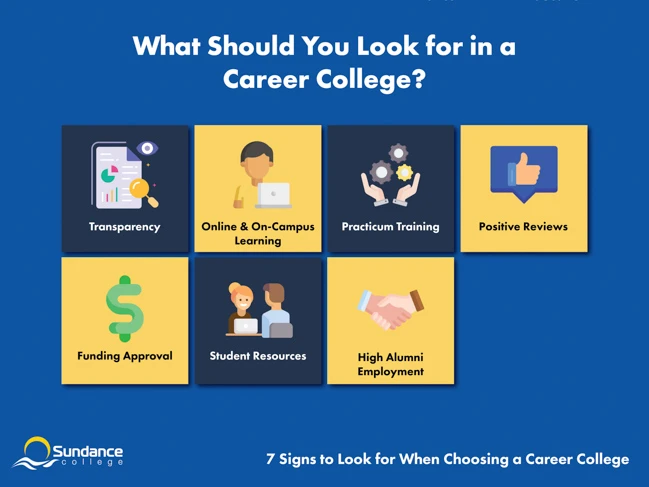Blog / 7 Signs It’s Time For a Career Change
7 Signs It’s Time For a Career Change

Explore our Diploma Programs
- Business, Hospitality, and Legal
- Health and Human Services
- Technology
It’s important for prospective students to choose a career college that will put students first. Here are 7 important things look for, before committing to a career college:
Table of Contents
When you enroll in college, you expect and deserve to receive a quality education that will help you advance your career. Unfortunately, not every institution delivers to this standard. Identifying colleges that operate with integrity and respect will help you make the best decision for your career and finances.

1. Transparency During the Enrollment Process

Speaking to an advisor about career college should be a helpful – and exciting – experience! At this stage, you’re gathering the information you need to make an informed decision about your future.
You and your advisor should openly discuss tuition and funding, admissions requirements, program structure and expectations, refund policies, and the college’s responsibilities to students. Importantly, at no point should you feel rushed or pressured to make a decision.
Trust your gut: does the college seem genuinely invested in supporting you and your career goals?
2. Availability of Approved Student Loan Funding
Most students need financial assistance to attend College. And most of them rely on government student loans. They have a much lower interest rate than loans obtained from banks, and students may also qualify for grants that don’t have to be paid back. In addition, when you receive a government loan, you don’t have to start paying it back until 6-12 months after you complete your program, and you have 10 years to pay it back! That is not the case with bank loans.
Almost 99% of Sundance College students access government financial aid to pursue their education and career goals. Private colleges must be designated by provincial and federal governments so that their students can access Student Aid funding. There are online tools that can help you determine whether a career college qualifies for government student aid.
It’s important to note that government student grants, loans, and bursaries are never guaranteed. The government – not the private college – approves applicants based on factors like household income, dependents, and merit. However, while colleges cannot promise you any form of government financial supports, they can assist you in applying.
3. Online and On-Campus Learning Modalities

One style of learning may not suit every student. Online, asynchronous learning is notable for its convenience, particularly for students who work full-time or live far from campus. However, other students may prefer the structure and in-person camaraderie of on-campus learning.
Look for a career college that gives you the choice between online or on-campus learning (or offers a hybrid of the two). Ask your advisor about the structure of each modality, to determine which is the best fit for you.
4. Resources for Student Success and Well-Being
Your career college should have support systems in place that enable students to bring their best selves to class. At Sundance College, students have access to several supports, including:
College Preparation Training
All incoming students complete a pre-diploma course that prepares them for post-secondary education. In this course, they learn techniques for notetaking, testing, time-management, and are guided through processes for online learning, when applicable.
Mental Health Counselling
Through keep.meSAFE, our mental wellness program, students have unlimited access to mental health experts, for 24/7 confidential support.
Career Services
Our career services team helps students develop their resumes, apply for jobs, and prepare for interviews. With this added support, our students can easily transition into their new careers.
5. Practicum Training Included

The opportunity to develop your abilities in a supportive but professional environment is invaluable. To prepare you to meet your career goals, a career college should have practicum training built into their programs.
At Sundance College, we offer practicums ranging from 5 to 7 weeks. Our practicums give students time to refine their skillsets and forge professional connections. In fact, many of our students are hired for a permanent position by their practicum employer!
6. High Employment Rate for Alumni
You’re investing in a college education to further your career. Naturally, alumni employment rates are a key indication of whether an institution is worth your time and tuition. That’s why career colleges must report employment rates to regulating bodies to keep their provincial licensing.
At Sundance College, 95.83% of alumni find employment in their field within 6 months of completing their program.
7. Positive Google Reviews

One of the best ways to assess the quality of a college or program is to hear directly from its students. Search on Google and social media to learn about first-hand student experiences. Look for reviews that address the following:
- Were staff and instructors competent, accessible and supportive?
- Did the student receive the flexibility and accommodation when needed and possible?
- Did the curriculum prepare them for their new career path?
You’re likely to learn a lot from people in similar life circumstances to your own. What have previous students said about studying remotely, attending college while parenting, or making a career change later in life?
It’s also a good idea to pay attention to how a college responds to reviews – positive and negative. This will lend you insight into how the college communicates with students and solves problems when they arise.
Accreditation of Colleges and Universities in Canada
Colleges and universities are not accredited in Canada, but individual programs may be accredited or approved by an existing regulatory body. For example, our Addictions and Community Health Professional Diploma program is approved by the Canadian Addiction Counsellors Certification Federation (CACCF).
Some programs have no option for accreditation, as there is no regulatory organization in that career path. For example, medical office assistants do not have an accrediting body. Therefore, no college or university in Canada can say they offer an accredited program for this career.
With this system in place, no college can rightfully state or advertise that they are an “accredited” college.
Choose a College That Puts You First

Take the time you need to feel confident in your career college choice. First instincts are often reliable, but you should also do your own research. Compare programs between colleges, ask your advisor detailed questions, and read reviews written by students and alumni. The decision is a big one, so give it the attention it deserves.
Your college should be as invested in your career goals as you are. Our mission at Sundance College is to support student success. Every choice we make is driven by delivering quality education that advances our students’ careers.
To learn more about what sets Sundance College apart, you can fill out the Request Info form and connect with an advisor.
Subscribe for more career advice
Blog Categories
Share on:
